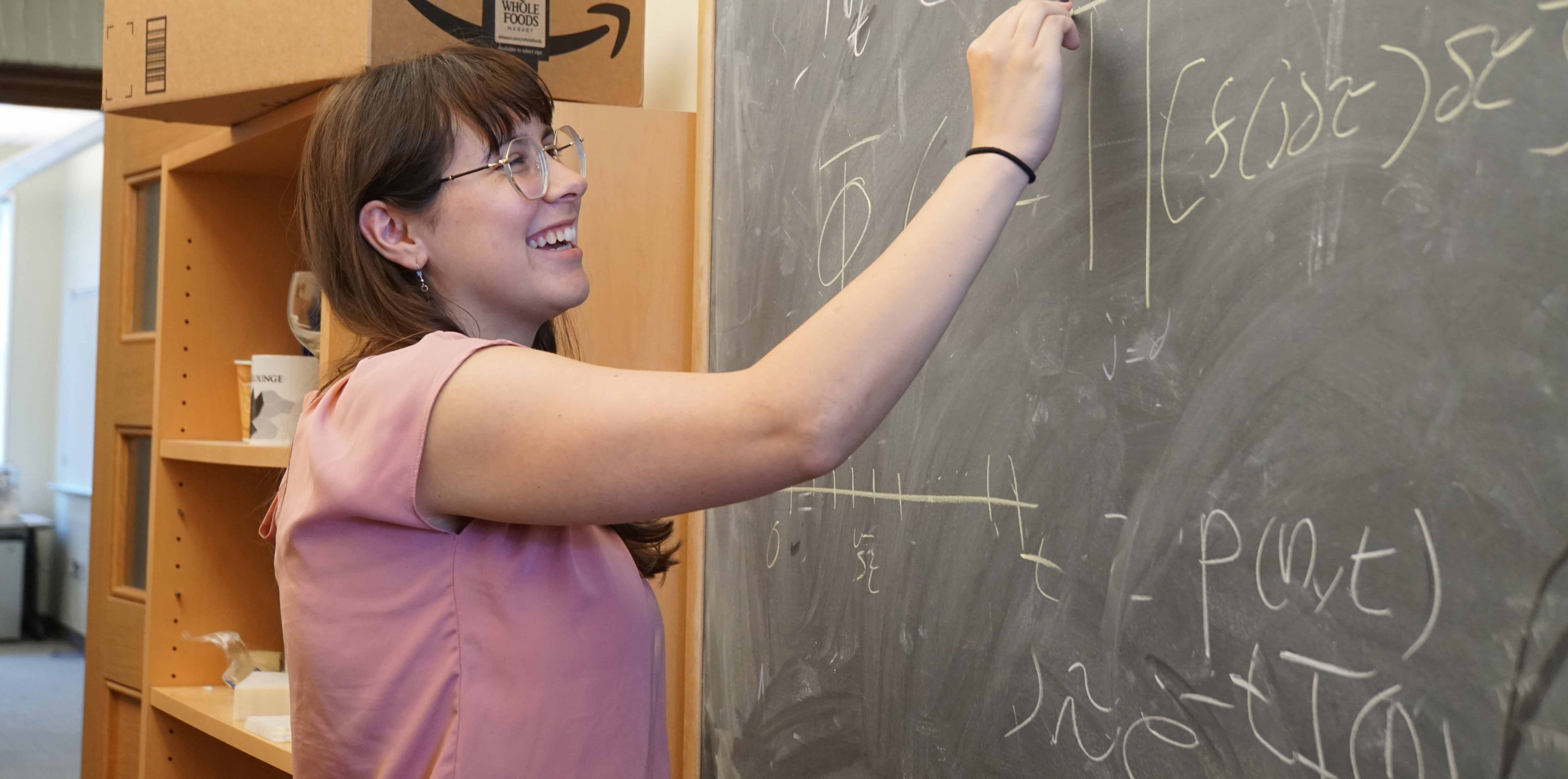USA Physics Senior Performs Research Internship at Harvard University
Posted on March 11, 2020 by Arts and Sciences

Sabrina de Jong, a current physics senior at the University of South Alabama, performed a summer research internship at Harvard University in the John A. Paulson School of Engineering and Applied Sciences.
“It was an amazing opportunity where I got to meet lots of new people and hone my skills in conducting research,” de Jong said. “I had the chance to work with my wonderful mentor, Ethan Levien, where our goal was to better understand how phenotypic variability evolves within bacterial populations using mathematical modeling and Python.”
De Jong’s research was titled “Evolution of Variability in Bacterial Populations.” She says this was her first ‘real’ exposure to being a part of an extensive research project, start to finish.
“My mentor lined up a few projects for me to choose from based on what I was most interested in studying,” de Jong said. “The research that we did would fall under the area of biophysics or biomathematics as we were using physics and math to get a better understanding of a biological system. The last time I had taken a biology class was tenth grade, so this was a great opportunity for me to be exposed to another field that I had not spent a lot of time in previously.”
Levien, a postdoctoral fellow in applied mathematics at Harvard, said de Jong was a dedicated researcher and enjoyed working with her during the summer.
“I was impressed with Sabrina's willingness to learn new scientific concepts, many of which even upper-level graduate students find challenging to master,” Levien said. “ Sabrina was able to utilize these concepts to make tangible research progress while maintaining a positive attitude throughout the process.”
De Jong, who grew up in Mobile and attended Baker High School, was “quite nervous” about doing the internship. She had not traveled that far away from home before.
“I also thought that I would not fit in at Harvard because it is an Ivy League school, and I had never been to a school that big or to a city that big,” de Jong said. “I also felt like maybe it had been a fluke and that I did not actually deserve to be there.”
Out of more than 650 applicants, de Jong was selected as one of 70 students accepted to the summer internship program at Harvard.
“Once I got there, I began to feel a lot better,” de Jong said. “The faculty and staff, including my mentor and the director of the program, were incredibly helpful. The other students were the same, and some also felt the same way that I did. Everyone there was just trying to do their best and learn as much as they could. I began to feel like I did belong, and my imposter syndrome faded.”
During the research internship, de Jong worked to better understand how phenotypic variability evolves in a bacterial population.
“This form of bet-hedging strategy is not uncommon amongst organisms and is even found in those a little more complex, like varying germination events in plant seeds or maturation rates of insects,” de Jong said. “Phenotypes are the set of observable characteristics of an individual resulting from the interaction of its genotype with the environment and is mostly used to describe different characteristics in bacteria cells.”
In the short period of 10 weeks, de Jong’s team was not able to get conclusive results. However, they were able to learn how random switching between phenotypes of a bacteria cell can help the population to survive and how a mutant population can eventually take over a population.
“What we were interested in most was finding the fixation probability, or the likeliness of a mutant population to take over,” de Jong said. “We only got as far as creating a simulation and deriving a formula to model and predict the population’s fixation probability for constant environment. But before I left, we did begin researching how this bet-hedging strategy of random switching would take effect in a slow-changing environment. This mutant survival strategy is most important in a fluctuating environment. So that was our end goal, to understand the mechanisms of this evolutionary strategy in a fluctuating environment.”
Since doing the summer research program de Jong found a new love and interest for bacteria and biology. She is excited to apply what she has learned in her physics and upper level math courses to other disciplines, like biology.
“Sabrina is a hard worker and focused student,” said Romulus Godang, USA physics professor. “Her extraordinary persistence in working on physics problems has made her successful. Giving up is not an option for her. She has proven to be a take-charge type of student in my classes.”
De Jong says the experience she received from the REU (Research Experience for Undergraduates) at Harvard was like no other.
“This internship helped me to decide on whether I wanted to go to graduate school or not and helped me pick an area of study that I might want to work toward once I get there,” de Jong said. “I learned a lot of new skills as well as how to be more confident in myself. I highly recommend that anybody that has the opportunity to do a research internship, or any internship, should seize the opportunity. You will learn a lot. Not just about the techniques and methods commonly used in your field, but also about yourself.”
